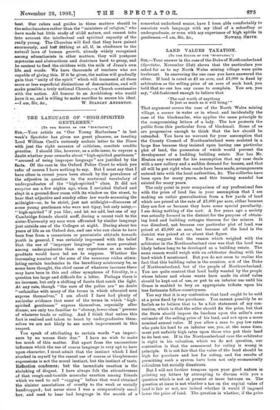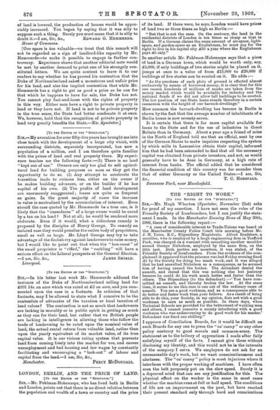LAND VALUES TAXATION.
ITO EDITOR OP TITS "BP ISOTAT011.1
SIR,—Your answer in the case of the Duke of Northumberland (Spectator, November 21st) shows that the particulars you asked for as to my North Wales mining village were quite irrelevant. In answering the one case you have answered the other. If land is rated at £1 an acre, and 21,000 is fixed by arbitration as the selling price of an acre of such land, you hold that no one has any cause to complain. You are, you say, "old-fashioned enough to believe that
'The real worth of anything Is just as much as it will bring."
That argument covers the case of the North Wales mining village, a corner in water or in wheat, and incidentally the case of the blackmailer, who applies the same principle tp the compromising letters of a lady. The law protects the public from this particular form of blackmail. Some of us are progressive enough to think that the law should be extended. You have no warrant for your assumption that the County Council of Northumberland were mulcted in a large fine because they insisted upon having one pirticular plot of land, the possession of which would prevent the development of a budding building estate. Nor has Mr. Heaton any warrant for his assumption that my case deals with a new colliery and a sudden demand for houses, and that all will be put right when roads have been made, arrangements entered into with the local authorities, &c. The collieries have been open for many years, and this housing scandal has existed for many years.
The only point in your comparison of my professional fees with the price of land lies in your assumption that I am making an unfair generalisation from a few yards of land which are priced at the rate of 21,000 per acre, either because they are few or because they have some special peculiarity. I am doing nothing of the sort: A few years ago a society was actually formed in the district for the purpose of obtain- ing land and building cottages thereon for the miners. It was dissolved, not because one particular plot of land, was priced at 21,000 an acre, but because all the land in the district was priced at or about that figure.
You suggest that the reason which weighed with the arbitrator in the Northumberland case was that the land was likely before long to be developed as a building estate. The same reason would weigh with an arbitrator dealing with the land which •I mentioned. But you do not seem to realise the fact that this building value is the creation, not of the Duke of Northumberland, but of the people of Northumberland. You are quite content that land badly wanted by the people whose labour and whose wants have made its chief value should be kept out of use, or put to an inferior use until his Grace is enabled to levy an appropriate tribute upon his less fortunate fellow-countrymen.
You say that it is my contention that land ought to be sold at a price fixed by the purchaser. You cannot possibly be so foolish as to believe that to be a fair statement of my con- tention, which is that the seller should fix the price, but that the State should impose its burdens upon the seller's own estimate of the selling price of his land, and not upon a mere nominal annual value. If you allow a man to pay low rates who puts his land to an inferior use, you, at the same time, must put unfairly high rates upon those who put their land to its best use. If in the Northumberland case the arbitrator is right in his valuation, which we do not question, our contention is that the assessment for rating is wrong in principle. It is not fair that the value of the land should be high for purchase and low for rating, and the results of permitting such a system hare been not only economically ridiculous but socially disastrous.
But I will not further trespass upon your good nature in printing my letters by attempting tp discuss with you a question which is not at present at issue between us. The question at issue is not whether a tax op the capital vain(' of land is fair or not, nor indeed whether it would if imposed lower the price of land. The question is whether, if the price
of land is lowered, the production of houses would be appre- ciably increased. You began by saying that it was silly to suppose such a thing. Surely you must mean that it is silly to [Our space is too valuable—we trust that this remark will not be regarded as a sign of landlord-like rapacity by Mr. Hemmerde—to make it possible to engage in further con- troversy. Experience shows that another editorial note would be met by another demand to print one of his strangely con- stituted letters. We are quite content to leave it to our readers to say whether he has proved his contention that the Duke of Northumberland asked a monstrous and unfair price for his land, and also the implied contention that while Mr. Hemmerde has a right to get as good a price as he can for that which he happens to have for sale, the Duke has not. You cannot play fast-and-loose with the rights of property in this way. Either men have a right to private property in land or they have not. If land is not to be private property in the true sense, the State had better confiscate it at once. We, however, hold that the recognition of private property in land very greatly benefits the State.—ED. Spectator.]



















































 Previous page
Previous page